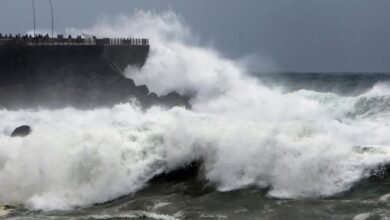The Paradox of Climate Change: Rivers Dry Up and Seas Rise
As the sea level rises, the river dry up. Climate change leaves paradoxes and new challenges for humanity .

As a consequence, we are faced with a worrying panorama: there is less and less fresh and drinkable water, and we need water to live. Photo: Pexels
LatiAmerican Post | July Vanesa López Romero
Escucha este artículo
Leer en español: La paradoja del Cambio Climático: se secan los ríos, crecen los mares
We are facing the greatest environmental crisis that our species has experienced throughout history. This is caused by three crises: the climate, biodiversity and pollution . Each one feeds on the others, to the extent that climate change is caused by greenhouse gases produced by pollution, deforestation and the use of territories for livestock and agriculture, which implies a loss of biodiversity. In the face of these crises there are challenges for the world, accompanied by paradoxes, especially for regions such as Latin America that have historically experienced aggravating consequences.
Why do rivers dry up but seas rise?
It sounds very paradoxical to say that, while the sea level rises, and even coastal cities are threatened , other water bodies such as rivers, lakes and lagoons are drying up more quickly and remain that way for most of the year. This happens because as the global temperature increases the glaciers melt causing the sea level to rise, but the droughts get stronger , drying (sometimes almost completely) these bodies of water.
A recent study by researchers at McGill University in Montreal, Canada, states that more than half (between 51% and 60%) of the 64 million kilometers of rivers that exist on planet Earth dry up for most of the time of the year or stop flowing periodically . Bernhard Lehner, one of the researchers, says that this percentage will increase in the coming decades. According to the study, the main culprits are accelerated climate change and the extraction of drinking water for human and agricultural use .
Also read: Green Hydrogen: Can It Save the Environment?
As a consequence, we are faced with a worrying panorama: there is less and less fresh and drinkable water, and we need water to live. In addition, with dry rivers, thousands of species (apart from human) are affected.
Long-term consequences that must be avoided immediately
Another of the paradoxes that the environmental and climate change crisis brings with it are the consequences that are not seen now, but that we will definitely see in a few years materialized in natural disasters and scarcity of resources. One of the most important characteristics of this crisis is that in many ways it looks like the Coco; it's something we all fear but have never seen. And to say that we have never seen it is relative, because the truth is that those who do not see the immediate consequences are people who do not belong to highly vulnerable communities .
Latin America, for example, is one of the regions that pollutes the least compared to world powers. However, it is very vulnerable to the impact that climate change brings, as it is not prepared to face it either economically or structurally . Here, we see then another paradox. These are asymmetric conditions that put the lives of people at risk who are less likely to generate a change in the fight against the environmental crisis.
Responding effectively to these paradoxes requires structural changes from governments and international organizations. But, above all, it requires a unity in the measures that are taken. A unit that should not only be on paper or in the large conferences and meetings that world leaders do, but in the civil community as well, so it is necessary to focus efforts on pedagogy, one that teaches how to live sustainably and that focuses in taking care of the resources that we may lose in the future at all costs.




